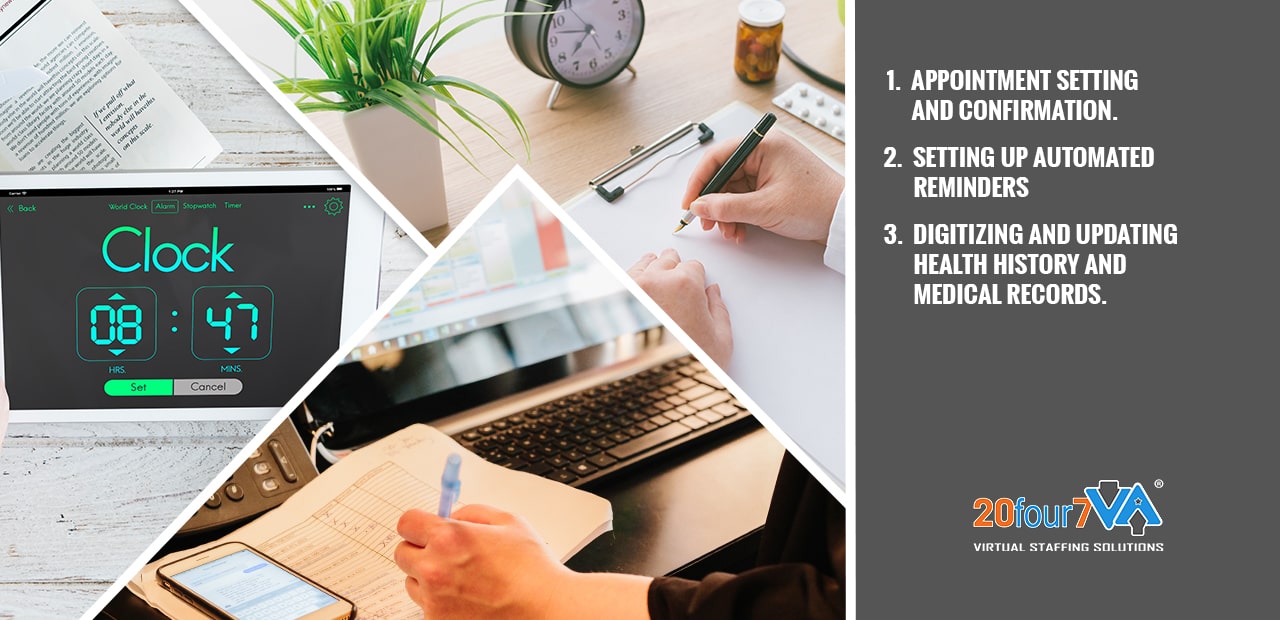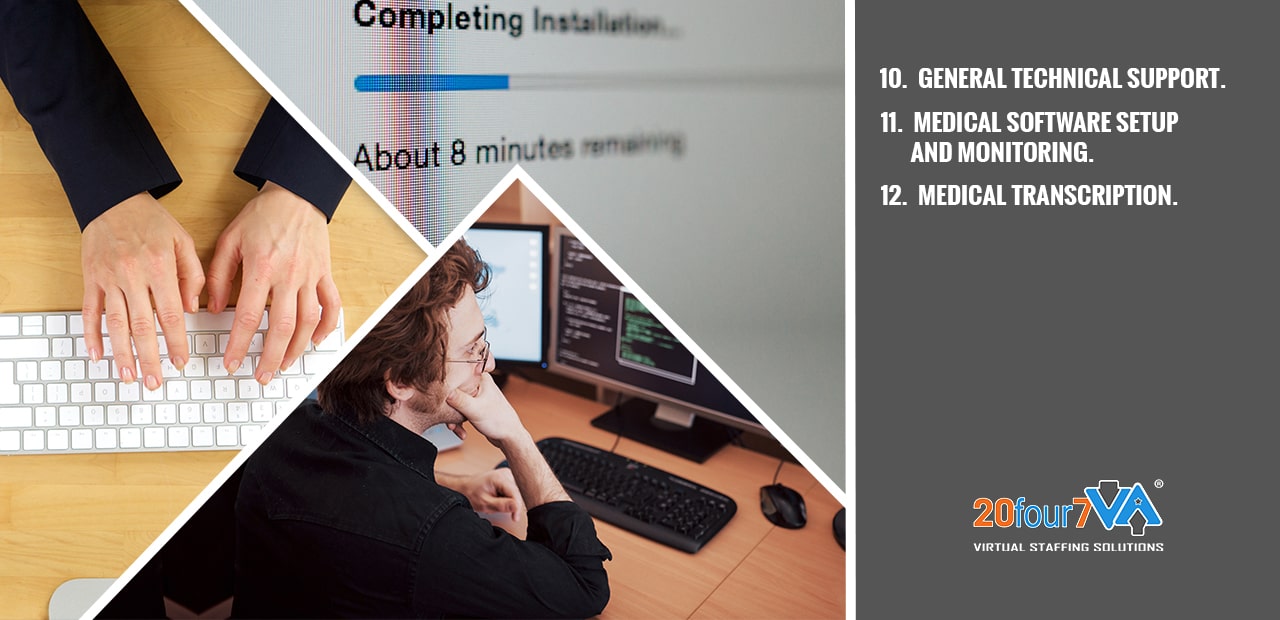15 Skills a Medical Appointment Setter VA Can Do

Virtual assistance has been dubbed as the future of the workforce. As the pandemic pushed almost every business and service provider into new ways of operation, this truth has become more apparent than ever. In the time of worldwide health crisis, virtual assistance has become a vital tool in regulating the spread of infectious illnesses. Even better, it enables patients to seek medical help or continue obtaining healthcare services from their providers in the comforts of their homes through telemedicine and the help of a virtual medical appointment setter.
Telemedicine and The Virtual Assistant Appointment Setter
Telemedicine, otherwise known as Telehealth, is the remote provision of medical assistance or healthcare using technology. Through telecommunications and electronic medical tools, doctors, nurse practitioners, and other healthcare providers are able to examine patients, provide medical support, and dispense medications remotely.
While the world grapples with COVID-19, telemedicine becomes an indispensable tool in controlling the spread of the infection and keeping both patients and healthcare practitioners safe.
As health organizations and the government continue their efforts to produce and provide COVID-19 vaccines, it is crucial for healthcare practitioners to keep or start providing telemedicine options to patients.
This huge leap to healthcare is enabled and empowered by a Telehealth virtual assistant (VA). Like other VAs, a Telehealth virtual assistant can provide multiple services and offer a myriad of benefits to their team beyond setting a health appointment online.
What Can a Telehealth Virtual Assistant Do For You?
In an age where fake news and fear-mongering are prevalent, it is important to ensure that only proper and up-to-date health information is shared. This is where healthcare virtual assistants step in. A Telehealth virtual assistant initiates and improves the dialogue between healthcare providers and their patients.
Here are 15 skills that you can expect from a Telehealth VA:

-
Appointment setting and confirmation
Patients need to book an appointment to be seen by their healthcare providers. Telehealth VAs can just schedule appointments online or over the phone to minimize contact and keep clinic schedules organized. Pre-booking appointments also help in ensuring that clinics are not packed and social distancing is maintained. If your practice has a website where patients can book appointments, Telehealth VAs can call, text, or chat with patients to confirm their appointments or offer alternatives as needed.
-
Setting up automated reminders
Apart from booking appointments, practitioners also need to remind patients about their schedules, payments, or other engagements that involve their healthcare. Telehealth VAs can set up email reminders so patients keep their scheduled appointments, pay bills on time, or submit documents required by their providers.
-
Digitizing and updating health history and medical records
An EMR (electronic medical record) contains all health-related data of a patient – from their history and diagnoses to the medicines and tests that they received and the allergies and treatment plans that they currently have. EMRs are more organized, easily accessible, and secure compared to their paper counterparts. They can be shared across different healthcare settings to make the job of practitioners a lot easier. Telehealth VAs can digitize health records from paper copies and update them with every point of contact.

-
Insurance verification
Telehealth VAs also take care of insurance verification. The process involves contacting insurance companies to certify that a patient’s required procedures and prescribed medications are covered by their benefits. Insurance verification needs to be completed before the patient receives the services. Otherwise, patients risk paying out of pocket.
-
Answer general patient inquiries
Patients can have questions, requests, and clarifications about different matters, from insurance issues and prescription clarifications to scheduling concerns. However, doctors, nurse practitioners, and other healthcare providers can’t be expected to drop what they do and squeeze in time to answer general inquiries. Telehealth VAs can help in monitoring and answering these questions. Furthermore, they can provide additional sources of information to help with a patient’s inquiry.
-
Medical billing
Ease up the workload in your practice by delegating medical billing to a Telehealth VA. The VA can submit, follow up, and appeal health insurance claims so healthcare practitioners can receive payment for their rendered services.

-
Online customer support
Healthcare facilities are now expanding to different virtual platforms to reach and support patients. Have social media channels? Make sure comments and direct messages are answered by your VA. Telehealth assistants can also extend customer support through email, text, and chat channels.
-
Live appointment assistance
Telehealth is a huge step in medical practice. Through technology, patients and providers can communicate remotely. The process is straightforward and simplified by the help of a Telehealth VA. Generally, the VA sends the video conferencing link to the patient via text or email. After the patient joins, the VA would greet the patient and assess their history of present illness and review of systems (HPI and ROS). When these are taken care of, the VA would then send the same video conferencing link to the doctor or nurse practitioner and present the patient. While the doctor and patient is in discussion, the VA takes note of any update or significant information and simultaneously updates the patient’s chart or EMR.
-
Prescription assistance
Another huge advantage of telemedicine is electronic prescription processes. Practitioners, through the help of VAs, can refill, start, hold, or discontinue a prescription electronically. The patient’s preferred pharmacy receives these updates so they can respond to the changes appropriately.

-
General technical support
Not all patients are savvy with technology. Connection issues and online tool glitches can also be expected to happen. For such instances, your VA can provide general technical support to the patient. They can call the patient’s phone to talk them through the resolution process. They can also send step-by-step instructions via text so patients can connect to the video conference or fix their tech problems.
-
Medical software setup and monitoring
Healthcare providers handle sensitive information. It’s imperative to set up and maintain security in all their software, tools, and web properties. Telehealth VAs can be the specialists to take care of these responsibilities.
-
Medical transcription
Many healthcare VAs have training and experience in medical transcription. They can transcribe or type out voice-recorded medical reports from physicians, nurses, and other practitioners. These reports can come in the form of voice files, lecture notes, and other spoken medical records.

-
Digital marketing
Apart from providing Telehealth-related services, VAs can also help in advertising. Find VAs with training, skills, and background in content creation, social media marketing, and web design to boost your online reach.
-
Triage assistance
The pandemic has pushed health organizations into more stringent protocols and regulations. Telehealth VAs, while located remotely, can help execute these orders. They can process and record patient information, put clinic protocols into effect, implement physician orders, and prioritize clinic visits and referrals to different facilities.
-
Executive assistance
Need support with your personal tasks? Assign executive duties to your VAs such as calendar and Inbox management, appointment setting with stakeholders. Your VA can also organize out-of-town conventions. As your practice expands, you may require the help of more than one Telehealth VA. Your present medical assistant can assist in the training and onboarding process of new Telehealth staff.

Benefits of Virtual Medical Appointments
Working with a medical appointment scheduler is one of the best investments you can make for your practice.
Apart from the apparent convenience that comes with it, virtual medical appointments can also:
-
Save time
No longer would patients need to drive down to your location to book an appointment, find answers to questions, or pay bills. In the same way, practitioners and their staff will have more free time when workloads are shared with a Telehealth specialist.
-
Cut business costs
Hiring in-house employees is a lot more expensive than hiring a Telehealth appointment setter. When you hire a Telehealth VA from 20four7VA, you’re relieved from taking care of payroll, insurance, training, and office space and utilities.
-
Access credible assistance
Staffing firms generally pre-screen applicants before recommending them to clients. In specialized fields such as telemedicine, stricter requirements are imposed such as a degree in nursing, pharmacy, and other healthcare fields, HIPAA or Health Insurance Portability and Accountability Act training and certification, and preparation in specific tasks such as transcription and EMR management.
-
Increase in-house productivity
Just consider the many skills a medical appointment setter can bring to the table. Delegating administrative, customer support, and marketing tasks will bring a huge relief to the workload of your in-house staff. Your local employees are bound to be more productive when they are not swamped.
-
Generate leads
More and more healthcare facilities are becoming aware of the benefits of working with a Telehealth VA. You want your practice to be ahead of the curve. As experts of digital operations, your Telehealth VA can help in designing your website, curating content, and engaging clients.
Conclusion
Healthcare practitioners are finding ways to continue supporting patients in the time of global health crisis and lockdowns, not the least of which is virtual medical appointments. As private organizations and government agencies work hand in hand to develop, procure, and disseminate medical support including the COVID vaccine, telemedicine continues to be a vital tool in such undertaking. Telemedicine has demonstrated and left an indelible mark in healthcare that it will surely remain even after the pandemic has passed.











Thank you so much for this post. It’s well detailed and informative. Please, is there any online course that helps/trains one to become a Healthcare VA? I’m interested.